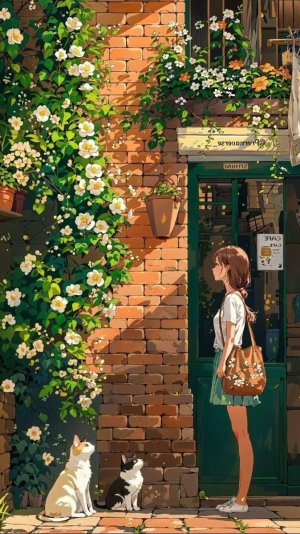
This review may contain spoilers
A drama that makes you want to live... badly.
A drama that makes you wanna live… badly. That’s the one sentence that stayed with me the whole time. Our Movie (우리 영화) is the kind of story that makes you want to step outside, breathe in deeply, get soaked in the rain, watch the sunset with nothing but silence around you. It’s a reminder, one we don’t get often enough, that despite the chaos and routine of life, you do want to live. Deeply. Fully. And ironically, this drama achieves that by breaking your heart and healing it at the same time.The title Our Movie isn't just about the literal movie that Daeum and Jeha were making together. It's the life they were living. The one you live with them, moment by moment. It’s a rare case where the title actually feels like a perfect fit... So simple, yet so layered.
I questioned whether I should give it a 10. I usually reserve 10s for more “grand” productions, epic plots, sprawling settings, ensemble casts. But this drama? It hit just as hard because it was the opposite. So minimal in its form: few locations, a small cast, a rather simple storyline. But emotionally? Absolutely massive.
It was also one of my most anticipated dramas of the year. Namkoong Min and Jeon Yeobeen are two of my favorite actors, so I kind of knew I was in for a ride. Probably tears, heartbreak, and a lot of reflection... And still, it gave me more than I expected.
Daeum, as a character, was stunning. Not just in her brightness, but in how alive she was despite her terminal illness. And strangely enough, as someone who’s healthy, I found myself jealous of her. How do you live so boldly? Love so earnestly? Laugh so freely? How do you shine so unapologetically that the people around you have to follow that light?
She changed everyone, from Jeha to her father, and watching Jeha gradually open up was one of the most quietly rewarding arcs I’ve seen. From the shell of a man into someone who laughs, connects, and finally dares to live. Even though we didn’t learn too much about him, it didn’t matter. This was Daeum’s story. Her life, her ending, her legacy.
The cinematography is breathtaking. Every frame feels intentional and intimate. The OST may not be flashy or instantly memorable, but it fits like a second skin — quiet, warm, and deeply in tune with the story. And the acting? Flawless. Jeon Yeobeen delivers one of her most raw, soulful performances, and Namkoong Min’s restrained portrayal complements hers perfectly.
Two scenes that especially stayed with me are the rain kiss and the one where Jeha runs to her to see the sunset together. Not because they are romantic in the usual sense, but because they encapsulated everything this drama is about. Longing. Urgency. Sacrifice. Unconditional love.
Our Movie might not be a drama for everyone. The ending might not necessarily be happy, it's not packed with twists, it's not heavy on backstory, and it doesn’t tie everything in a neat bow. But for those who are at that stage in life and who let it wash over them, it becomes more than just a drama. A gentle but unforgettable reminder that life, in all its messiness, is worth living fully.
Was this review helpful to you?
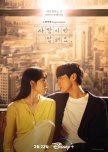
Almost Perfect
Call It Love is easily one of the best melodramas I’ve seen in a while. It’s one of those where I desperately needed a happy ending because the lead couple went through so much pain and heartache along the way.The story itself isn’t something you’ve never seen before, but it’s told with a creative touch and gives us the POVs of all the main characters in a way that makes everyone feel relatable. There were so many heart-fluttering and endearing moments.
To be honest, in the first couple of episodes, I was worried it might not live up to my expectations. It felt a little too slow-paced, even for someone like me who loves slowburns. But then it started picking up, and I could see how they were gradually caring more and more for each other, how they were falling in love without even realizing it. And oh gosh, I enjoyed those quiet moments sooo much! The first time they held hands, even if it was just for show, for Dongjin's ex to see, it was so heartwarming I was screaming and kicking my feet.
The ML was frustrating at times with how nice he was, letting everyone walk all over him. But then the FL came into his life, started protecting him, and quietly cared for him in every possible way. She could be snappy and inconsistent, but she defended him in subtle ways that he thankfully noticed. Even her blunt words somehow gave him comfort, and watching him slowly change and find happiness because of her was beautiful.
The visuals and scenery were gorgeous, the OST was perfect, and the heartbreak felt so raw it came right through the screen. I was scared we wouldn’t get a happy ending, but we did. Still, it felt a little incomplete. I wish we had seen more of their happiness instead of cutting it short.
If I had to nitpick, the drama could’ve been trimmed down to 12 episodes instead of 16, as there were moments where it dragged. The ending also felt slightly rushed. But overall, I loved it. Their chemistry was amazing, the emotional beats landed perfectly, and it was one of those dramas that stays with you for a while after the credits roll.
Was this review helpful to you?

Everything doesn’t need to be logical to hit deeply
I can’t help but be biased when it comes to Lovely Runner. Even after watching well over a hundred dramas, and not even being a huge fan of rom-coms, this one holds the most special place in my heart. There are probably better dramas I've seen in terms of production or storyline, but a drama doesn’t have to be perfect to move you deeply. So allow me to be unapologetically subjective in my love for it.At one point, I even debated whether to write a review. Despite its popularity and high ratings, it feels like people are often hating on it just for the sake of it... Calling it overrated, cringy, and whatnot. But everyone has their own taste. Here’s why Lovely Runner stands out as one of the best rom-coms I’ve seen.
First and foremost, the chemistry between the leads is unmatched. There are very few dramas where the romance feels this warm, this alive, this magnetic. The way they portrayed the feeling of choosing each other again and again across timelines was everything. I didn’t even need the time-travel logic to make sense (although it was quite solid in my opinion). I felt the emotional truth of it. So many scenes were breathtakingly beautiful, overflowing with raw emotion.
I’ll admit, Im Sol frustrated me sometimes. Her stubbornness, her need to shoulder everything alone, her tendency to hurt Sunjae unintentionally by hiding things “for his own good”… at times it was tough to watch that. But oddly, that’s what made the love story feel even more real. Flawed, frustrating, and deeply human.
And then there’s Byeon Wooseok. I didn’t even really know his name before I started this drama. But wow. He IS Ryu Sunjae. One of those rare cases where the actor doesn’t just play the role, but becomes it. I truly believe Lovely Runner wouldn’t be half as magical without him. His emotional range, his sincerity, his ability to bring so much heart to every scene. I absolutely adored his golden retriever energy. He made Sunjae unforgettable. And I don't think that incredible chemistry could’ve happened without the real-life care and respect he clearly has for Kim Hyeyoon (the BTS clips say it all).
It’s also probably the only idol-themed drama I’ve seen that doesn’t feel flat or cliché. It handled the impact idols have and the sincerity of fan love with surprising depth.
And the OST? Don’t even get me started. A year later and I still listen to half the soundtrack regularly, screaming my lungs out to those gorgeous lyrics. "Sudden Shower" most of all will forever be legendary.
At the end of the day, Lovely Runner is one of those dramas that stay with you. The blue door. The yellow umbrella. And finally, the kind of love that defies time and logic to find its way back. To me, that’s unforgettable.
Was this review helpful to you?
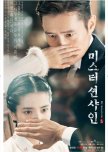
A heartbreaking masterpiece that stays with you
Mr. Sunshine is, without a doubt, the most heartbreaking masterpiece I've ever seen. I put off watching it for years. 24 episodes felt like a lot, and I worried the 2018 release might feel a bit outdated by now, in 2025. But giving it a chance turned out to be one of the best decisions I’ve made when it comes to K-dramas.The quality is Hollywood-level, with a storyline so intricate and detailed that those 24 episodes felt fully justified. It’s not the kind of drama you binge in a weekend. That's typically what I do. But this time, I had to watch slowly, with breaks, making space in my heart each time to absorb everything. It demands your attention, your patience, and big emotional investment to truly grasp its value.
At its core, Mr. Sunshine is deeply tragic. The weight of Korea’s historical pain is ever-present, but what broke me the most was how that tragedy echoed through every single character. No one felt sidelined. Each character had their own journey, their own sacrifices, their own heartbreak. It’s rare to find a drama where the supporting characters (and cast) is developed just as richly as the leads. Writing about each of them would take me ages.
This was my first drama with Lee Byunghun, and I was genuinely blown away by his performance. Needless to even mention, Kim Taeri was incredible, too. The contrast between her delicate appearance and her fierce transformation into a revolutionary heroine was stunning. Go Aesin's arc is full of quiet strength and impossible choices. At times, I hated her for being so cold, for being ready to sacrifice even the people she loves for her patriotic cause... But that's what makes her irreplaceable.
The cinematography? Breathtaking. Every frame is filled with care and meaning. The drama is soaked in symbolism, history, and emotion. It’s also educational in a way that doesn’t feel preachy. I walked away with a greater appreciation for Korea’s complex past.
Would I have loved a happy ending? Of course. Both for the characters and for the country. But it’s precisely because we didn’t get that, because it ended the way it did, that this drama became so iconic. It reflects a painful reality, and it doesn’t try to soften the blow.
I cried a lot, more than once. And after that final episode, I just sat there with swollen eyes, staring at the wall for a good 15 minutes, trying to process what I had just witnessed. However, I’m so grateful this drama exists.
Was this review helpful to you?

A meditative retreat into simplicity
Don’t go into Little Forest expecting anything grandiose. What it offers instead is a gentle reset for the mind and spirit. If you need that right now, don't even think twice. Go watch it.It follows a familiar premise: a young woman leaves behind the stress and disappointment of city life to seek solace in the countryside. But unlike other stories in this genre, this one doesn’t overexplain or dramatize. There’s no heavy trauma, no big cast of quirky characters, no heavy emotional monologues. It’s just Hyewon, her childhood home, two friends, the wonderful changing seasons, and a steady rhythm of cooking, farming, and reflecting.
Kim Taeri delivers such a grounded, introspective performance. She was exceptional, as always. You watch her come back to her rural roots thinking she’s only staying a few days. But little by little, through farming with old friends, preparing creative seasonal meals, and reliving quiet memories of the time with her mother, she starts feeling whole again.
Her growth felt real and subtle, and it resonated deeply. I found myself thinking, I wish I could just drop everything and disappear into a place like that too... Away from corporate noise, somewhere where I'm self-sufficient and in peace (though I’ll admit I’d be terrified of bugs).
The cinematography is absolutely gorgeous. The way it captures the quiet beauty of the seasons and the intimacy of preparing food... Even for someone like me who isn’t into cooking, all of that felt almost meditative. Every frame relaxed my system.
I loved how the film didn’t try to wrap everything up neatly either. The ending was open yet satisfying, reflecting Hyewon’s quiet rediscovery of herself and her mother.
Little Forest is a film that asks for very little but gives a great deal. It's a breath of fresh air for anyone feeling burnt out or quietly yearning for something slower, simpler, and more honest.
Was this review helpful to you?
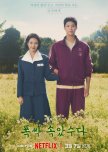
A drama that reshapes your heart
I’ve watched over a hundred dramas, but very few have left me speechless the way When Life Gives You Tangerines did. To me, this wasn’t just a drama. It was a quiet, devastating, and deeply human masterpiece. A reminder of what it means to endure, to live, and most of all… to love.Some may call it overrated, and at first those comments surprised me. But I realized this story speaks loudest to those who’ve faced life’s weight and struggled with the burdens of family, poverty, dreams deferred, and grief that lingers for decades. If you’re at a different stage in life, maybe it won’t land the same. And don't get me wrong, that's completely fine and normal. But for me, this story felt like home... warm, flawed, messy, heartbreaking, and unforgettable.
The character of Gwangsik alone raised my standards for men to the stratosphere. I’m not even sure someone like him could exist in real life. A man who lived every breath for the people he loved, who gave everything without ever asking for anything back. His quiet sacrifices, his constant presence, his gentle strength... He left an imprint on every soul around him, and on mine. Watching him love Aesun from childhood to his last breath was a devotion in its purest form.
And then there’s Aesun, never letting the world dim her. She stayed vibrant, dream-filled, stubborn, and radiant, even through loss. She reminded me that it's never too late to chase what matters to you, even at 70, even when your world has already broken apart once, twice, maybe more.
This drama does jump across timelines, from 1997 to 2004 and beyond, and while that might seem confusing at first, every puzzle piece clicks into place eventually. Each moment, no matter how small, ends up meaning something.
The cinematography is quiet and poetic, washed in nostalgic tones that make it feel like a memory. And the storytelling is patient. You’re not bombarded with twists or dramatics. It’s subtle, and yet it guts you. Every character, even those with just a few minutes of screen time, had depth, pain, and dreams.
The most unforgettable line came from Gwangsik, passed down to his daughter. A line that became the emotional anchor of the whole show: “If you can’t, just back down. We’re always here for you.” So simple, yet so healing. Painful even. I wish everyone in the world could have a parent like him.
And I can’t leave this without mentioning the OST. It’s honestly one of my favorite parts of the entire experience. The opening song brought Jeju to life, not just with the music, but with those dreamy animated scenes that set the mood before each episode even began. And “Midnight Walk” by d.ear… that one stayed with me. It’s a song I keep returning to when I need to slow down and breathe.
If I could rate this drama more than 10/10, I would. This isn’t just one of my favorites, but one of the most important stories I’ve ever watched.
Was this review helpful to you?

This review may contain spoilers
Loved it to the moon and baek
Sorry, I had to use that phrase 🤭 But jokes aside, Trigger was a really pleasant addition to my list. The story itself isn’t super unique, but the main characters are what made this drama so good.Honestly, the moment I saw that Kim Youngkwang had the villain role, I knew I had to watch it. And oh lord, he delivered!!! I don’t think anyone else could’ve portrayed Moon Baek better. He was so damn charming and had this Joker-like aura that instantly captivated me. At first, he was such a pookie that I thought, “Okay… how is this man gonna turn into a villain?” But the transition was so smooth. He’s definitely one of those relatable villains you can’t fully hate, because you can see where they’re coming from.
Abandoned as a baby, victim of human trafficking, tortured, even losing an eye in the process… Then an American gang dealing in weapons took him in, saw his “villain potential,” and gave him the opportunity to return to Korea, the country that had failed him. I’m not exactly sure if he was a narcissist or a sociopath, but his vision that “free weapons would let people take justice into their own hands” was chilling yet oddly logical from his perspective.
On the other hand, we have Lee Do who also had a brutal past, but chose the opposite path. And don’t we all love a capable cop who knows exactly what he’s doing? It was inspiring and heartwarming to see how much he genuinely cared about people.
Still, despite these two amazing characters, the drama felt incomplete. There was so much more that could’ve been told and shown. I’d happily watch a sequel, though I’m not sure if Moon Baek even survived. Honestly, even without a sequel, the drama could’ve been longer. At least 12 episodes would’ve given it more room to breathe.
Some moments didn’t make much sense to me. Like… how would a country like South Korea let millions of firearms be distributed like bread every day? How did Moon Baek just stroll around freely, even shooting Lee Do in the middle of a city square without anyone stopping him? There were a few of those head-scratch moments, you know what I mean.
But overall, the drama was engaging, had me seated the whole time, and was perfect for binge-watching with its 10 episodes averaging about 40 minutes each.
The core question it raises is compelling: Would you want guns to be legal? And if they were, would you want to own one?
Was this review helpful to you?
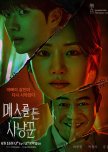
A character study disguised as a thriller
Hunter with a Scalpel is, at its heart, a disturbing yet eye-opening confrontation between a psychopath father and a sociopath daughter. From the first episode, the dynamic is suffocating. What unfolds isn’t just a crime thriller, but a psychological chess game between two people bound by blood, trauma, and terrifying intelligence.What frustrated me most was how Park Juhyun's character tries to carry all the weight herself. It was even painful to watch her keep everything bottled up, trying to outmaneuver her monstrous father alone. In the end, she doesn't just come out emotionally wrecked but physically scarred for life. And though it was kinda satisfying to see her be the one who ultimately captures him, it’s hard to call that an ending. His punishment? Nowhere near enough.
The killings themselves were disturbingly brilliant and graphic. Every murder meticulously planned and chillingly executed. The show doesn’t glamorize violence, but it doesn’t hold back either. There's a cold, clinical precision to it all that aligns with the father's character perfectly. And yet somehow, it’s the emotional wounds that sting more than the gore.
While romance isn’t something I usually focus on in thrillers, the chemistry between Park Juhyun’s and Kang Hoon’s characters was definitely present. There was space for more development there... A connection that felt real but left dangling. I personally needed more from that thread to feel closure.
Kang Hoon himself gave a solid performance, and I always enjoy his acting (and his gorgeous face), but the writing didn’t give his character enough to work with. He was caring, persistent, and clearly tried to fight for her, but there were moments where I wanted more intensity, more darkness, more emotional grit to match the gravity of the situation. The balance felt slightly off.
Although the average episode length was 30 minutes (which I find refreshing), this drama isn’t fast-paced. It’s methodical, almost clinical in its delivery. The story tightens slowly around you, like a tourniquet. That pace won’t be for everyone, but if you’re drawn to stories that dissect human psychology, this will be right up your alley.
The OST is minimal but haunting, fitting perfectly with the drama’s sterile, subdued atmosphere. Visually, it’s clean, almost too clean, which adds to the unnerving feeling throughout.
It’s not a drama you watch for catharsis or comfort. It’s one you watch with a frown, a raised brow, and the creeping realization that you’re not sure who you’re rooting for. But you keep watching anyway, because there's something disturbingly poetic about it all.
Was this review helpful to you?

